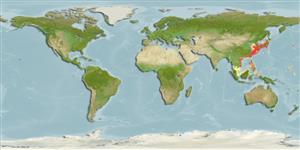Environment: milieu / climate zone / depth range / distribution range
Οικολογία
Θαλασσινό(ά) βενθικό(ς); εύρος βάθους 25 - 615 m (Ref. 11230). Tropical
Northwest Pacific: southern Hokkaido, Japan southward to the South China Sea.
Μέγεθος / Βάρος / Age
Maturity: Lm ? range ? - ? cm
Max length : 40.0 cm TL αρσενικό/απροσδιόριστο; (Ref. 559); μεγ. δημοσιευμένο βάρος: 950.00 g (Ref. 40637)
Short description
Κλείδες προσδιορισμού | Μορφολογία | Μορφομετρία
Μαλακές ραχιαίες ακτίνες (συνολικά) : 15 - 17; Μαλακές εδρικές ακτίνες: 15 - 17. Lower half of the inner pectoral fin with scattered numerous pale spots (bluish in life, white or pale in preserved specimens); black blotch appears occasionally on lower inner part of pectoral fin.
Found in the tropical to warm temperate areas (Ref. 9771), in sandy or sandy mud bottom (Ref. 11230).
Life cycle and mating behavior
Γεννητική Ωρίμανση | Αναπαραγωγή | Γεννοβολία | Αβγά | Γονιμότητα | Προνύμφες
Richards, W.J., 1999. Triglidae. Gurnards, sea robins, armored gurnards, and armored sea robins. p. 2359-2363. In K.E. Carpenter and V.H. Niem (eds.) FAO species identification guide for fishery purposes. The living marine resources of the WCP. Vol. 4. Bony fishes part 2 (Mugilidae to Carangidae). FAO, Rome. (Ref. 9771)
IUCN Red List Status (Ref. 130435: Version 2024-1)
Threat to humans
Harmless
Human uses
αλιεία: Εμπορικό(ά); αλιεία αναψυχής: ναί
Εργαλεία
Special reports
Download XML
Διαδικτυακές πηγές
Estimates based on models
Preferred temperature (Ref.
123201): 6.1 - 23.1, mean 17.9 °C (based on 261 cells).
Phylogenetic diversity index (Ref.
82804): PD
50 = 0.5010 [Uniqueness, from 0.5 = low to 2.0 = high].
Bayesian length-weight: a=0.00692 (0.00460 - 0.01040), b=3.06 (2.94 - 3.18), in cm total length, based on LWR estimates for this species & (Sub)family-body (Ref.
93245).
Τροφικό Επίπεδο (Ref.
69278): 3.9 ±0.7 se; based on diet studies.
Ελαστικότητα (Ref.
120179): Μεσαίο(α), ελάχιστος χρόνος για διπλασιασμό πληθυσμού 1,4 - 4,4 έτη (Preliminary K or Fecundity.).
Fishing Vulnerability (Ref.
59153): Low to moderate vulnerability (30 of 100).
Nutrients (Ref.
124155): Calcium = 117 [64, 272] mg/100g; Iron = 1.07 [0.57, 2.26] mg/100g; Protein = 18.6 [17.1, 20.0] %; Omega3 = 0.422 [0.177, 1.206] g/100g; Selenium = 86 [41, 213] μg/100g; VitaminA = 23.5 [8.5, 64.7] μg/100g; Zinc = 1.04 [0.72, 1.57] mg/100g (wet weight);
